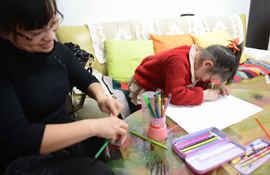|
 |
 |
|
A FAMILY CHORE: A housewife chops firewood in Xixiangtang District of Nanning, capital of Guangxi Zhuang Autonomous Region, on September 1, 2012 (CFP) |
A CARING MOTHER: A girl in Qiqihar, northeast China's Heilongjiang Province, draws a picture at the company where her mother works on January 31 (YU HONGCHUN) |
"I felt superior to some other women at that time and having a stable job even made it easier for me to find a husband," she said.
Dou added that her job was very important for her and she has never considered giving it up to be a housewife, as her salary fed the family. "Without a job I would not have been able to support myself and raise my child."
However, for Liu Qian, a 39-year-old woman who works at a middle school in Beijing, the most important reason for work is to make a living.
Expenses are high in the big metropolis. With surging house prices, people in the city suffer enormous pressures.
When Liu was asked why she works, she gave a rather simple answer: "For a living!"
"A woman should not have to rely on anyone, but be financially independent because nobody is reliable, including your husband," she said.
Besides satisfying the basic need to live and being financially independent, work means much more for the younger generation women who are highly educated. Fang Shan is such a woman.
Holding a bachelor's degree in English from Beijing Foreign Studies University and a master's degree in integrated marketing from the U.S. Northwestern University, her reason for work goes beyond satisfying basic needs.
Currently marketing director of a hi-tech start-up company in Suzhou, east China's Jiangsu Province, Fang said work enables her to realize her personal value.
"Work makes my life more meaningful and interesting. I am doing something I feel excited about," she said.
Fang added that her job gave her a sense of fulfillment. She would face up to any difficulties to achieve her goals.
Rising status
According to a report issued by China CITIC Bank in January, 37 percent of urban women's salaries account for more than half of total family earnings.
With rising income amongst women comes improved family status.
According to the aforementioned report by the All-China Women's Federation, 85 percent of women are satisfied with their status in the family. More than 70 percent take part in property purchasing and other types of financial investment.
In addition, about 40 percent take charge of family income while another 40 percent manage incomes together with their husbands.
As many women assume the role of mother, daughter and wife at the same time, they decide what products to buy for their children, parents and husbands. According to statistics from cosmetics e-commerce website Lefeng, 77.3 percent of married women in China decide what food, clothing and daily items to buy.
During the past Spring Festival, women constituted the majority of customers at shopping malls, with their spending focused on clothing and cosmetics. In addition, digital products and travel have become new spending options.
| 